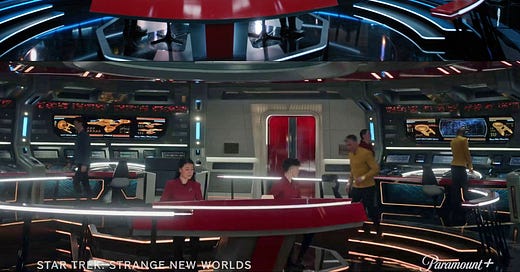SF/F Review – Uprooted
It's Hugo Season! For the next 2.5 months we will be reading the Hugo Nominated novels. First up - Uprooted!
Synopsis: A young girl with enormous magical talent is chosen to save her village – nay, her country! – from the forces of evil.
Book Review: “Our Dragon doesn’t eat the girls he takes, no matter what stories they tell outside our valley.” This is one of the best opening lines I have ever read, maybe one of the best in SF/F history. How can you read that first sentence and NOT want to read the next one? The entire first page is the best opening page ever, and really the whole first section is the same way.
You’ve probably already heard of Uprooted, it’s made every best-of-the-year list, and just won this year’s best novel Nebula. And yes – everything you’ve heard is true. This book is fantastic. It is often witty and hilarious. The tension and stakes keep ratcheting up throughout the novel. The characters are all very distinct and feel real. The evil Woods are straight-up creepy as hell and terrifying! And the ending that brings it all together in a resolution that makes you say “ooooooh…. Damn….” is the most satisfying thing ever. Y’all gotta read this.
You might not realize it at first. For the first two chapters, I thought I wouldn’t like this book. Because while I always wanted to read the next page, it was all terribly cliché and predictable. It was the standard Chosen One Fantasy Story, where an unusual protagonist without many friends is found to have been born with un-noticed but super-powerful magic gifts, and must train under a Mentor so s/he can venture out to slay the evil. It was extremely reminiscent of Game of Thrones (literally the first book) in this way. I also disliked the first book for the first 2/3rds of it. It was just standard fantasy tropes all over again. The medieval setting, the Lawful Good Paladin Lord who would uphold Honor and Justice no matter what, etc. There was a cliché on every page, and I only kept reading because it was entertainingly written, and I had been assured by friends it was really good. And then the big WHACK happens, and everything changes, and I realized “Oh shit, no… this is a book about subverting all those old tropes!”
Uprooted isn’t exactly that. But its writing style matches the protagonist at all times. The protagonist starts out every inexperienced and naïve. The story style is likewise, very naïve and clichéd, feeling like uninspired YA fare. But as the protagonist matures and becomes wiser to the realities of the world, so too does the writing grow and mature. Silly narrative conventions (“she was angry, so angry!”) are discarded for subtler and deeper prose. The story stops being trite and formulaic, and begins its true journey.
The journey also mirrors the Lord of the Rings structure, in a fractured way. I wrote a paragraph about it, but then realized it might be considered spoilery, even with the vague terms I used. Let it be said, those who enjoy the epic arc of LotR will have much to love here.
Perhaps more than anything, I love that this novel has to be a novel. I feel that a lot of novels I read would be just as effective (if not more so) as short stories, and were padded out. I almost never read series, because I’m of the opinion that series are 80% padding and almost every one would be greatly improved if it was cut down to a single novel-length. I have always used Deathless as my example of the epic-series-within-one-book. That novel takes us through 60+ years, the entire life of a girl who journeys into the realm of the gods, becomes a metaphysical archetype, and returns to earth. It explores the meaning of love and the horror of war. It covers TWO world wars, plus a war among the gods to boot. It is absolutely a grand epic story, which any less-skilled author would spin out into a 6+ book series. Catherynne Valente tells the whole story in one novel, and it is amazing. Naomi Novik has done the same thing with Uprooted, covering an epic story and a grand character arc, within a single novel. This is a story that COULD NOT have been a short story. It absolutely had to be a novel, and I love and respect the hell out of Novik for making it a single, self-contained book. This is what story-telling should be.
And OMG, I love how combining magic is literally spiritual sex! From the very first time they try it:
“I heard him draw a sharp breath, and the sharp edifice of his spell began grudgingly to let mine in.”
/swoon
On a personal note, I loved that it was set in Poland. I didn’t grow up in Poland, so I never thought I had any cultural roots there. But apparently simply being raised in a Polish house and having Polish relatives is enough. Every time I read a Polish name it felt a little bit like home, which was the weirdest damn feeling for me. :)
Yes, Recommended!
Book Club Review: In addition to being crazy enjoyable, this book does make one think about the nature of what it means to be human. Like any Chosen One narrative, it relies on the conceit that some people are Special. They’re just born that way. In this medieval setting that isn’t even questioned, because everyone knows that’s true due to inherited nobility. But there are sections where our protagonist speaks fondly of the common village-witch, who helps heal the little things she can, or spurs the crops, or whatnot. And that sort of thing always makes me sad, because… is that reality? Are some people simply born special? The protagonist thinks of that in very rosy, happy terms. To me, it feels monstrously unfair. There are the chosen ones, the gods amongst men, and no one else really matters. Sure, the protagonist feels very strongly about the sanctity of life, etc, but in the end… in a world where some people are born Special, isn’t she wrong? Do we want a world like that, as much as she romanticizes it? And, are we in that world already? It’s undeniable that some people are born with a lot more potential intelligence of physical strength than others. How is that OK?
It also verges on quasi-rationalist in some places. The Mentor makes a case for utilitarianism (“A life before you in the moment isn’t worth a hundred elsewhere, three months from now.”), which the protagonist wrestles with a fair bit. And by the end of the novel you are thinking of deep time, the struggle over resources, the inevitable (and unavoidable) expansion and encroachment of those who are different from you into your home, and the morality of nipping the problem in the bud before they can become an existential threat. Why, it’s basically the same theme as Dickinson’s “Three Bodies At Mitanni”, which I also loved!
There are some things to dislike as well, from the clichéd beginning chapters to over-reliance on just-in-time magic. But everyone in our book club loved it, and we had an astoundingly high turnout. Strongly Recommended.








